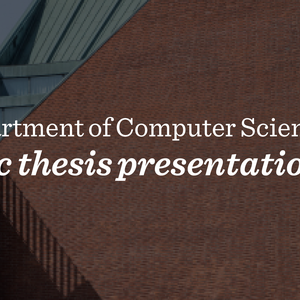Department of Computer Science: MSc Thesis Presentation

When
Where
Event language(s)
A New Tool for Exploring the Dynamics of Complex Systems Comprising DNA Molecules
Time: Monday 25 May at 11:00
Location: online at https://aalto.zoom.us/j/66559407443
Shiting Long will present her master’s thesis in computer science titled “A Modelling and Simulation Tool for DNA Strand Displacement Systems”. The tool DSDPy adopts a rule-based modelling approach and can successfully model reaction networks of DNA systems that follow the DNA strand displacement (DSD) mechanism.
DNA is one of the best-known symbols for biology. It exists as a hereditary material in all living organisms that controls development, survival and reproduction. The encoding of nucleotides that constitute DNA strands not only carries genetic information but also opens up possibilities for micro- and nano-fabrication. The research field that investigates this possibility and uses DNA molecules as non-biological building blocks to form arbitrary nanostructures is called DNA nanotechnology.
Aside from synthesising static structures, DNA nanotechnology has inspired designs of engineering systems with dynamic properties such as logic circuits and catalytic systems. This dynamic variant is enabled by the DSD mechanism, a process in which a strand that hybridises partially to another strand displaces one or more pre-hybridised strands. It has been proven that a DSD system can implement any physically realistic abstract chemical reaction network, which means that DSD systems are powerful tools for programmable chemistry.
These intricacies of Nature motivated Shiting to develop DSDPy, a Python package that generates and simulates the complete reaction network of a DSD system. It provides an easy-to-use interactive interface and customisable functions that can save users’ time in designing DSD systems and guide them with experimentations. In contrast with existing tools, DSDPy does not require programming skills, and in some cases, it generates additional species and more detailed reaction networks than that have been identified in the scientific literature.







